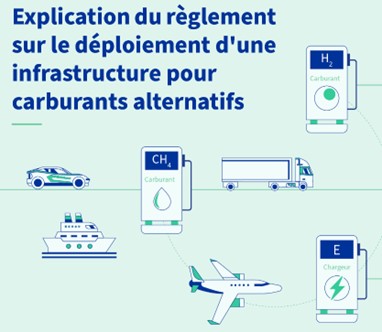Card payment now mandatory at electric vehicle charging stations

The deadlines linked to the Regulation respecting the deployment of an infrastructure for alternative fuels (AFIR) are materializing. Since April 13, they have concerned new installations of electric charging stations of over 50 kW. All new charging stations must be equipped with a card or contactless payment system. The aim? To simplify access to electric charging stations, as part of a wider plan to achieve climate neutrality by 2050.
FACTS
-
Since April 13, all new charging points over 50 kW have been required to offer a card or contactless payment option.
-
Since this date, CPOs (Charging Point Operators) and EMSPs (e-Mobility Service Providers) have been obliged to offer alternatives to the passes and subscription cards previously widely used by manufacturers.
-
For the time being, this applies to kiosks installed from April 13 onwards. By 2027, European regulations will extend this obligation to all charging stations over 50 kW, even those built before April 13, 2024.
-
AFIR is also set to tackle another recurring problem in electric mobility: the lack of transparency in charging station prices and payments. AFIR should oblige manufacturers to display :
-
Precise information on the availability of charging stations;
-
Waiting times;
-
Prices at different stations.
-
The AFIR should also rule on the prices offered by suppliers, indicating that they must be reasonable, transparent and non-discriminatory.
CHALLENGES
-
Regulating the supply of electric charging stations: The aim of regulating payments at charging stations is to build a standardized European transport network. In fact, this deadline is part of a much broader plan to increase the number of charging stations and make them homogeneous, so as to be able to offer a compatible road network on a European scale. For the European Union, the aim is for electric cars to rapidly benefit from the same ease of supply as thermal cars with today's service stations.
-
A measure already applied in some cases in France: some chargers at freeway service areas in France are already equipped with TPEs. This specificity is linked to the fact that the presence of a TPE on the charging stations was already a condition in the calls for projects issued by the main motorway concessionaires (Vinci autoroutes, Sanef, etc.) to equip their parking lots. In addition, it was a condition for receiving government subsidies for this type of project. A real advantage, since French fast-charging suppliers such as Allego, Engie Vianeo and Electra have already adapted to this specific requirement. Compliance costs will therefore be relatively low compared with other European players.
MARKET PERSPECTIVE
-
The European Union has set out a comprehensive timetable for achieving the AFIR objectives. From 2025, for example, fast-charging stations of at least 150 kW for cars and vans will have to be installed every 60 km along the main routes of the "Trans-European Transport Network (TEN-T)".
-
More generally, even seaports and airports are affected, and are obliged to adapt their infrastructures:
-
Seaports of a certain size are required to offer suitable loading points for container ships and other vessels by 2030.
-
Airports must be equipped with an electric charging point for aircraft at all boarding gates by 2025, and at all parking stands by 2030.
-
Mastercard, for its part, has anticipated this obligation. Last February, the company entered into a partnership with Last Miles Solutions, to offer a universal gateway solution for payments at electric kiosks. The scheme aims to provide CPOs with a simplified offering tailored to their needs.
